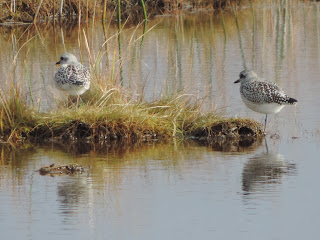Nature
Moncton Nature News
October 18, 2023
To respond by email, please address your message to the information line
editor, nelsonpoirier435@gmail.com
Please advise both the editor at nelsonpoirier435@gmail.com and the
proofreader nicholsl@eastlink.ca if any
errors are noted in wording or photo labelling.
For more information on Nature Moncton, check the website at www.naturemoncton.com
Edited by Nelson Poirier at nelsonpoirier435@gmail.com
Proofreading courtesy of Louise Nichols at nicholsl@eastlink.ca
**A special thank
you to Alyre Chiasson for his presentation to Nature Moncton on Tuesday
evening.
Alyre shared some
amazing information on the mechanisms of ice freezing and the equally amazing
techniques fish have developed to deal with it. Alyre also explained how the
chemicals fish produce are investigated for human uses. He also showed how the DNA
adaptations fish have evolved are being researched, again for possible human use.
A shout out as well
to Fred Richards for the efforts he is making to fine-tune Zoom use so that Nature
Moncton presentations can be available to all.
A few photos of
Tuesday night's gathering are attached today.
**John
Inman photographed a large, branched Coral
Mushroom, as well as 2 photos of Scaly
Vase Chanterelle Mushrooms which
were approximately 8 inches
tall.
Shannon
Inman photographed a cluster of Honey
Mushrooms fruiting on the dead balsam fir stump.
(Editor’s
note: as John pointed out, the Scaly Vase Chanterelle can grow quite large.
This is not a toxic mushroom but has an unpleasant sour flavour.
The Honey Mushrooms Shannon photographed
are in their prime and will get larger. This is a favourite edible mushroom for
many people, but suggestions are that it be well cooked.
John
also got an excellent photo of a juvenile Cooper’s
Hawk grabbing a meal in their Harvey yard.
**Ron
Arsenault shares an interesting comment after noting Shannon Inman’s Bullfrog
photo in yesterday’s edition.
Ron
comments, “WOW! A Bullfrog on October 16th!!! Contrast this with
the August 24, 1950, date given as the latest ever in John Gilhen's 1984 book ‘Amphibians
and Reptiles of Nova Scotia’ - a dramatic indicator of how the climate has
warmed in the intervening years.”
**Aldo
Dorio again photographed Black-Bellied Plovers still at Hay Island and now
showing their nonbreeding basic plumage.
Nature
Moncton
.%20OCT,%2017,%202023.%20%20JOHN%20INMAN.JPG)








%20OCT%2017,%202023%20SUSAN%20RICHARDS...jpg)
